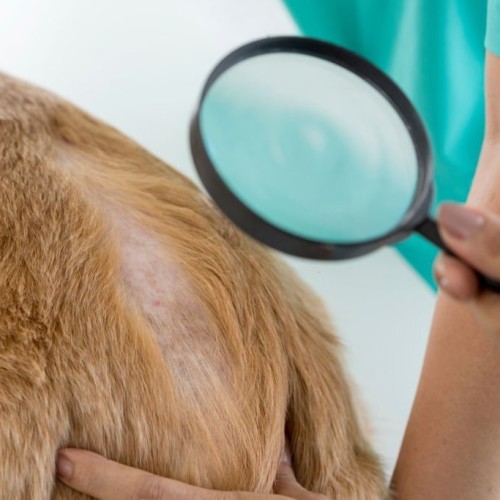Excellent Tips To Selecting Probiotics For Dogs
Excellent Tips To Selecting Probiotics For Dogs
Blog Article
How Can Omega-3 Fatty Acids Help With Joint Health In Both Cats And Dogs?
Omega-3 fatty acids, particularly EPA and DHA are essential to play a role in improving the joint health of dogs as well as cats. The reasons why they're so beneficial:
Anti-inflammatory properties
Reduce inflammation:
Function Omega-3 fatty acids possess powerful anti-inflammatory properties. They reduce the proinflammatory substances like eicosanoids or cytokines which can trigger inflammation.
Omega-3s have the ability to reduce inflammation and ease swelling in joints. This is advantageous for arthritis-related conditions. This allows pets to move more easily, improving their life quality.
Joint Lubrication and Health
Enhancement of Joint Lubrication:
Function Essential: Omega-3 acids are necessary for the maintenance of synovial fluid, which helps to lubricate joints.
Benefits: A better lubrication system means more fluid joint movements and less friction. This decreases wear and tear to cartilage. This is advantageous for pets with joint problems or who are at a high risk.
Cartilage Protection and Repair
Cartilage Protection:
Function: Omega-3s assist in maintain the health of cartilage by reducing enzymes which degrade cartilage.
Benefits: Protecting the cartilage from degrading maintains joint integrity and helps slow the progression of joint disorders such as osteoarthritis.
Immune System Support
Immune System Regulation:
Function: Omega-3 acids control immune responses, creating an equilibrium in inflammation.
Benefits: A healthy immune system that is well-controlled can help to better manage joint pain. This can prevent over joint pain and joint injuries.
Comfortable Mobility and Improved Comfort
Improved Mobility
Function: By decreasing joint inflammation and protecting joint structures, Omega-3s help pets move more freely.
Benefits: Pets who are older or those with arthritis often have improved mobility, resulting in a more relaxed and active lifestyle.
Additional Health Benefits
Overall Health:
Function The Omega-3 Fatty Acids help improve skin, cardiovascular and hair health in pet.
Benefits: A pet with a healthier body will likely to be more active and maintain better joint health as time passes.
Use and considerations
Dosage & Administration Dosage and Administration to administer will depend on the weight of your pet size, health and condition. It is important to follow the veterinarian's recommendations or the instructions on the label of the product.
Omega-3 sources: Fish oil supplements of high quality are a good source of EPA, DHA and other omega-3s. For safety and effectiveness it is important to use products that have been specifically designed for pets.
Omega-3 supplements have a generally beneficial effect on animals. However, certain pets might develop digestive issues or fishy breath. It is suggested to start at a lower dosage and then increase it gradually. This can help to minimize any adverse consequences.
Conclusion
Omega-3 fatty acid is beneficial to joint health in both cats and dogs. Their anti-inflammatory benefits, their ability to improve cartilage protection, joint lubrication characteristics and immune system support contribute to improved function of joints and reduce discomfort. Regular supplements can result in greater mobility, a healthier lifestyle and increased activity for pets. View the top pet wellbeing australia url for more recommendations including pet ashwagandha supplements, pet chamomile supplements, pet supplements for pets with fear of dental work, natural pet vitamins, pet milk supplements, pet supplements for pets with fear of collars and harnesses, pet brain supplements, pet supplements for pets with fear of illness and more.
What Is The Best Way To Treat Kidney Failure In Cats As Well As Dogs Who Are Supplemented With Omega-3 Fatty Acids?
Omega-3 fatty acids, specifically EPA(eicosapentaenoic ACr) and DHA (docosahexaenoic acr) aid in managing kidney failure by supporting kidney health. Here are some ways they can help you manage kidney disease:
Anti-inflammatory properties
Reduce Inflammation
Function The Omega-3 fatty acids exhibit strong anti-inflammatory effects, reducing the production of proinflammatory cytokines and eicosanoids.
Benefits: Omega-3s can reduce kidney inflammation. This can prevent damage to the kidneys and help improve the functioning of kidneys.
Blood Pressure Regulation
Lowering Blood Pressure:
Function: The omega-3 fatty acid can help regulate blood pressure, by enhancing the function of vascular vessels and reducing inflammation within the system.
Benefits: Lowering blood pressure reduces the stress on kidneys and assists in protecting the kidney function.
Proteinuria Reduction
Reducing Proteinuria:
Function: Omega-3s help to reduce proteinuria (the release of proteins into the urine) which is a condition which is a common occurrence in kidney diseases.
Reduced proteinuria can help to lessen the damage to the kidneys.
Glomerular Filtration (GFR) is a measurement of the rate at which a glomerular filtrate is produced, is maintained.
Supporting Kidney Retention
Function: The omega-3 acid is essential to maintaining the integrity of kidney's glomerular filtration process.
Benefits Maintaining a GFR 50% is essential to slow the progression of the chronic kidney disease.
Appetite Stimulation and Nutritional Support
Improving appetite:
Omega-3s are able to increase appetite in animals with kidney diseases, who often suffer from a decrease in appetite.
Benefits: Improved nutrition can support overall health and aid in maintaining muscle mass and body weight which is essential in pets suffering from kidney disease.
Cardiovascular Health
Supporting Heart Health
The function of Omega-3 fatty acids support cardiovascular health, by reducing blood pressure, inflammation, and improving lipid profile.
Benefits: A healthier cardiovascular system reduces the chance of developing complications, such kidney disease or heart disease. It also improves overall health.
Antioxidant Effects
Reducing Oxidative Stress:
Function: The antioxidant properties in omega-3 fatty acids reduce oxidative stress on the kidneys.
Benefits: Lowering the stress of oxidative aging assists in protecting kidney cells from damage, supporting the kidney's function and slowing the progression of disease.
Questions and Use
Dosage, administration and dosage: The dose of omega-3 acids you give depends on your pet's age, weight, health, and size. The veterinarian's recommendation or the product's label are important. Omega-3s are derived from supplements made from fish oil that are specially designed for pet owners.
Omega-3 supplements can be found for pets in various varieties. These include chews, liquid oils and capsules. Selecting a high-quality supplement is vital to ensure the safety and effectiveness.
Omega-3 supplements can trigger gastrointestinal upset in certain pets. By starting with a low dose and increasing it gradually and gradually, you can reduce any side consequences. It is essential to watch for adverse reactions such as nausea or diarrhea.
Conclusion
Omega-3 fatty acid supplements may be beneficial in managing kidney disease in cats and dogs. Their anti-inflammatory, blood pressure-lowering, proteinuria-reducing, and appetite-stimulating properties help support kidney function and overall health. Omega-3 supplements can slow down the progression of kidney disease as well as improve the quality of life for pets suffering from kidney disease. Follow the top dogs supplements for joints for blog tips including pet heart spet hops supplements, pet supplements for pets with fear of muzzles, pet rutin supplements, pet supplements for pets with fear of surgery, yeast infection natural treatment, pet supplements for pets with fear of crates and pens, pet supplements for pets with spinal problems, pet liver supplements and more.
What Are The Ways That Cat And Dog Getting Rid Of Yeast Infections By Apple Cider Vinegar?
ACV is usually recommended by veterinarians as a natural treatment for yeast infections. ACV could be beneficial however it is essential to apply ACV under the supervision of a veterinarian and with caution due to the acidic nature of ACV and possible negative side adverse effects. ACV has been thought to be helpful in the treatment of yeast infections.
Antifungal Properties
Acidic environment
ACV has a pH of 2.5 to 3 that is considered to be acidic. This acidic pH can inhibit yeast growth.
Benefits ACV's benefits include applying ACV topically to your pet or adding it to bath water can decrease the growth of yeast on the skin.
Skin pH Regulating
Balancing Skin pH:
ACV can help to regulate your skin's pH levels. This can promote an overall healthy skin barrier and stop the growth of yeast.
Benefits: Maintaining a healthy pH balance for the skin is a fantastic way to avoid yeast infections and maintain overall skin health.
Anti-inflammatory effects
Reduce inflammation:
Effect: ACV has mild anti-inflammatory properties.
Benefits: Lowering inflammation can alleviate symptoms such as redness itching and discomfort that can be associated with yeast infections.
Support for Digestive Health
Internal Use
ACV has been found to balance the gut flora and promote digestion when taken in small quantities and highly dilute.
Benefits Helping to support the overall immune system, microbial balance and gut health may reduce yeast growth.
Use and considerations
Topical application: Apply ACV in diluted form with water (typically, 1 part ACV to 1-2 parts water), as a spray or rinse to the affected areas of the skin or ear. Do not apply directly to wounds that are open or on sensitive skin.
Use for internal use: Always consult with a doctor prior to using it internally. ACV is best given in small quantities and highly diluted (1 tablespoon to 1 teaspoon for every cup of liquid) to prevent any stomach discomfort.
When using ACV topically take note for indications of irritation and allergic reactions. Discontinue ACV use if adverse reactions occur.
Consultation with veterinarians: Prior to applying ACV to treat yeast illnesses in animals, it's essential to speak with a vet. They can give advice on proper dilution techniques, methods of application, and potential risks based on your pet's specific medical needs.
Conclusion
Although apple cider may provide certain benefits when it comes to managing yeast infections in dogs and cats however, consumption of this vinegar must be done under the supervision of a veterinarian and with caution. ACV's acidic qualities can impede yeast growth within the ear and on the skin. It is also possible that they provide mild antiinflammatory benefits. But, dilution is crucial and also careful use to prevent irritation. ACV can be used effectively and safely when you adhere to instructions from a vet as part of an overall treatment plan to treat yeast diseases in dogs. Follow the best description about pet wellbeing for more examples including pet health supplements, pet supplements for pets with food sensitivities, pet supplements for pets with fear of change, australian natural pet products, best pet supplements australia, pet stress relief, natural dog supplements, pet prostate supplements and more.